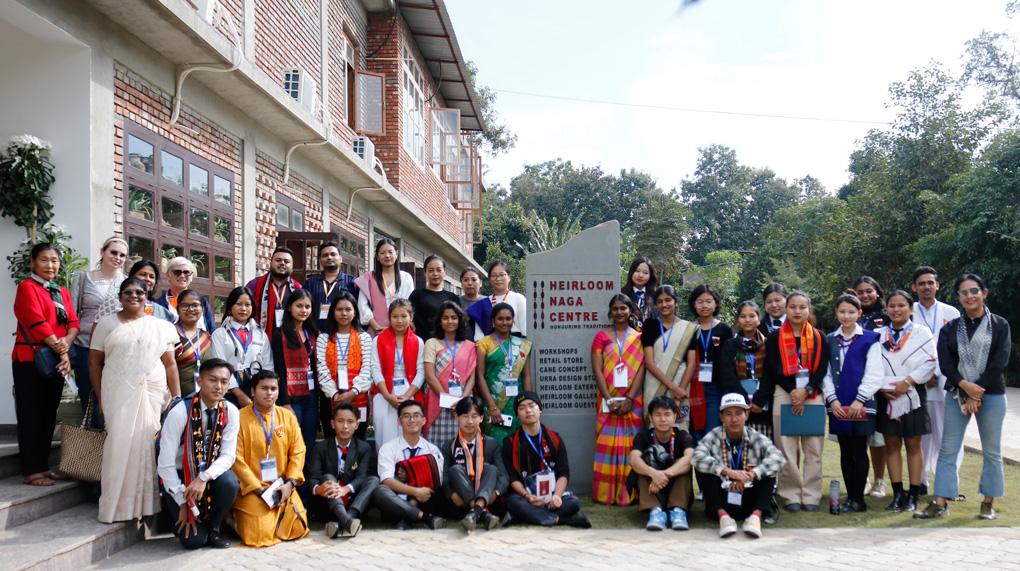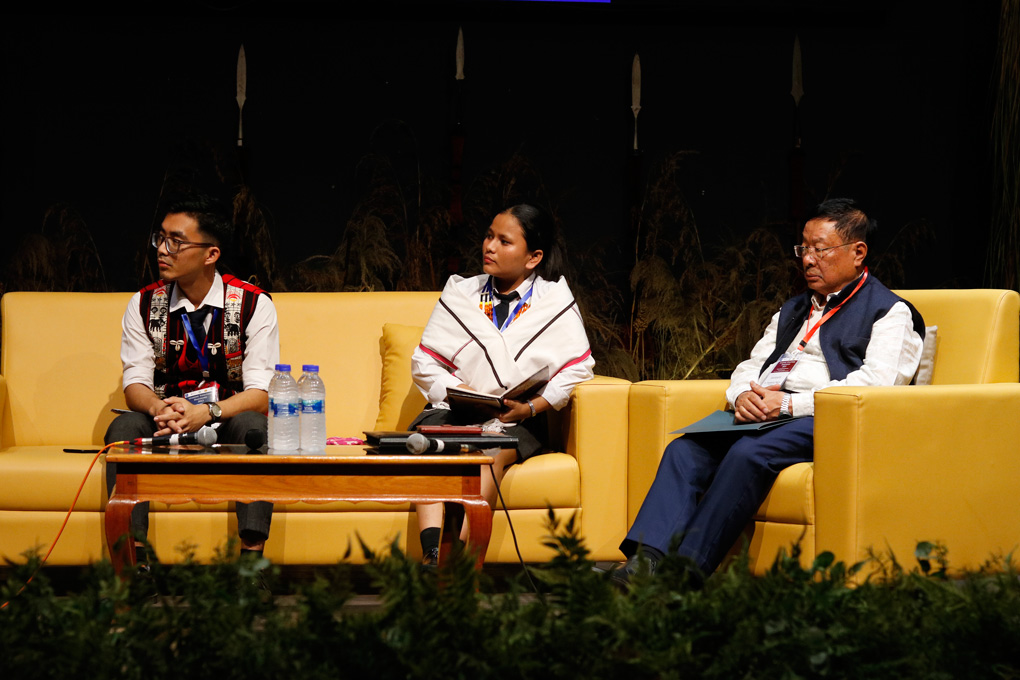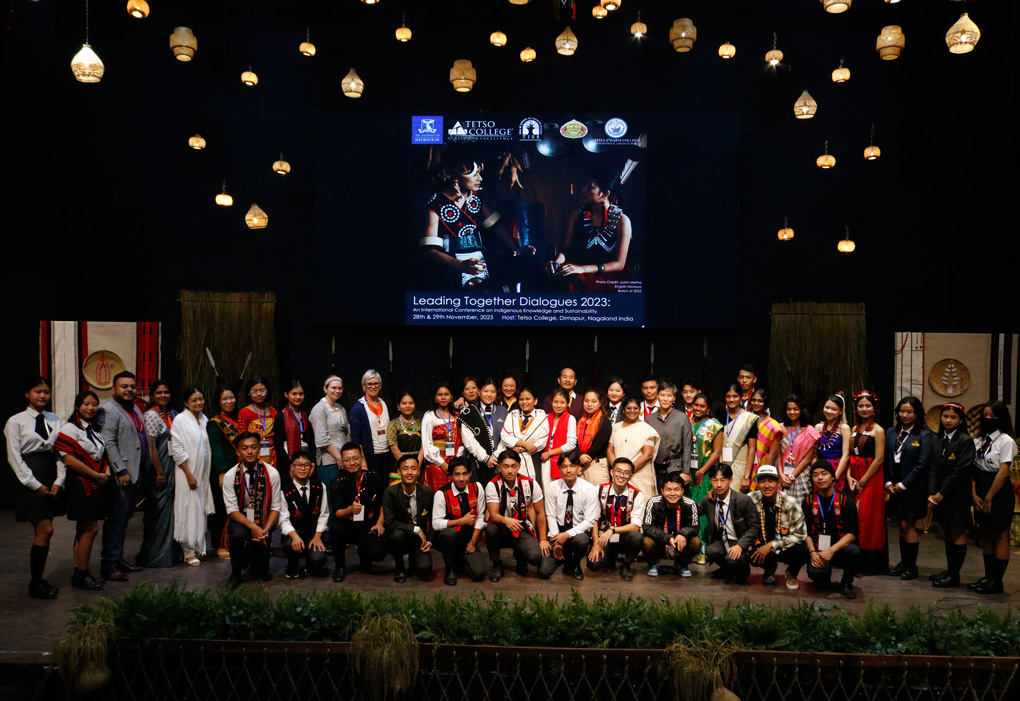A two-day international conference ‘Leading Together Dialogues 2023’ – a collaboration between undergraduate students led by the University of Melbourne and undergraduate students at four leading institutions across India – Tetso College in Nagaland, Stella Maris College in Chennai, Savitribai Phule Pune University, and the Tata Institute of Social Sciences, Guwahati campus, culminated on November 29 at Tetso College.
Day 2 began with a ‘Short Film & Documentary Screening’ hosted by Talinungsang, Asst. Dean, School of Computer Science, IT & NIELIT, Tetso College at Lorin Hall with Kirsty McKellar, Co-ordinator, Leading Together Program, University of Melbourne as the Facilitator, Dr. Lakshmi Priya Daniel, Associate Professor, Department of Fine Arts, Stella Maris College (Autonomous), Chennai and Dr. Wichamdinbo Mataina, Asst. Professor, Department of Linguistics, NEIIPA Convenor, Tetso College as Discussants.
The first documentary video was presented by Tata Institute of Social Sciences (TISS), Guwahati campus. The Video Harmony Legacy, is a short film that narrates the story of a young Indigenous girl named Nina and her wise grandmother. In a world confronted with environmental challenges, they convey a profound message about sustainability and living in harmony with the earth.
The second documentary video was presented by the University of Melbourne. The video is a First Nations-led, student-centred program in which a team of five Aboriginal and Torres Strait Islander students of the Murrup Barak, Melbourne Institute for Indigenous Development at the University of Melbourne in Australia, are on a journey together through experiences of First
Nations’ exhibitions and collections, including expert conversations with First Nations Leaders on Indigenous knowledges, material culture, art and place. The students have collaborated to create a video documentary, Warriors, on the season theme ‘Who are we now?’
The third documentary video was presented by Savitribai Phule Pune University. The video is an introduction and a short representation of the students from Arajpada who are beneficiaries of Nplusone/“Read A Story” a not for profit organization which focuses on education in the Talasri Taluka of Maharashtra. Read-a-story works largely with underprivileged pupils from the interior of Maharashtra, India, under the auspices of n+1, a not-for-profit organization that works in the field of education. We collaborate with the Zilla Parishad Schools, other NGOs, and the neighborhood to create a network of student volunteers that aids the child in developing his or her English. With a personal touch, we want to offer last-mile connectivity. The project aims to raise the reading proficiency of rural and tribal pupils who are first-generation English learners and come from low-income families. The goal behind the project was to connect volunteers with students who need help reading English and provide them with individualized coaching over simple phone calls. Our programmes are being implemented in Tamil Nadu’s 4 districts as well as Maharashtra’s Palghar-Talasari, Anvir, Adgaon, and Aurangabad. In his concluding remarks, he imparted a poignant note to the audience, leaving them with a profound thought: “Nature doesn’t need people. People need nature.”
The fourth documentary video was presented by Stella Maris College. This video portrays the challenges faced by indigenous people who migrate to the city for their livelihood and the poor condition of the Koovam river, where many local and migrated indigenous people reside nearby the highly polluted river. They encounter various problems such as mosquito infestations and
lots of other discomforts.
After the screening of films, three students from participant institutes presented their reflections of the documentary videos. Afterwhich, further discussions were done by the faculty delegates.

This was followed by field visits to Heirloom Naga and the Bamboo Resource Center (Nagaland Bamboo Development Agency) where the students gained insights into sustainable farming practices, biodiversity conservation, and the significance of bamboo as a versatile and eco-friendly resource. They also learned about the cultural heritage of the Naga people, their traditional farming techniques, and the importance of preserving heirloom seeds for agricultural sustainability. Additionally, the students discovered the various uses of bamboo, including its role in construction, crafts, and environmental conservation due to its rapid growth and versatility. Overall, the visit provided a holistic understanding of sustainable agriculture, cultural heritage, and the significance of bamboo in local communities. Meanwhile, a panel discussion on “Indigenous Heritage and Decolonization: The Naga Repatriation Journey” was also held where the panelists were Dr. Phyobemo Ngully, Consultant
Psychiatrist, Member of Forum for Naga Reconciliation, Member of Nagaland Medical Council, Chairman of Kohima Educational Society; Mr. Yimtiyong Longkumer, BA 5th Semester, History Honours, Tetso College and Mr. Ahyule Keppen, BA 5th Semester, Political Science Honours, Tetso College, and moderated by Manngai H. Phom, a member of Recover, Restore and Decolonize (RRaD).
The discussion began with the introduction of the Moderator and panelist by the host, Dr. Rosy Tep, HoD, Department of English Tetso College. The discussion began with the screening of two videos about the repatriation of the Naga ancestral remains in Pitts Rivers Museum in England and also the ancestral remains of the Native Americans in America.
In addition to leading the conversation, Mr. Mangai Phom served as the moderator. He discussed the significance of repatriation for the indigenous people. He also discussed the customary Naga burial system, using the Konyak village as an example.
Ms. Ahyule Keppen’s theme for the discussion was ‘My Personal Growth with Repatriation’. She talked about the unique culture of native people in Nagaland that was lost during the colonial era. She spoke about repatriation. She mentioned that the Leading Together Dialogues in 2022 served as the catalyst for his decision to pursue research on repatriation. Repatriation holds
immense significance to him since it allows him to regain his origins, identity, and dignity. It’s not just about getting antiquities back; it’s about taking back an important portion of history. She finds that repatriation is important because it restores one’s sense of pride and connection to the source and takes a strong stand against cultural appropriation and exploitation. She went on
to say that these artifacts are a priceless teaching resource for the next generation. Repatriation is a pivotal act as it’s a way to honor ancestors, preserve tradition and ensure that future generations have a deep understanding and connection to the roots.

The seeds of Mr. Yimtiyong Longkumer’s repatriation journey were sown during the captivating Morung Lecture XVIII, where the air buzzed with ‘A Conversation on Repatriation: Histories of Loss and Renewal of Hope’ on December 6, 2022. He mentioned how the discussion ignited a flame of inquiry and curiosity within him, prompting the realization towards the path of
repatriation which is needed to begin with a closer look at the awareness levels among students. Eager to delve into the perspectives and insights of his peers, he set out to conduct a survey, hoping to unveil a collective understanding of this intricate and transformative process. The lecture not only left him with thoughts but also spurred the speaker into action, kick starting
a journey of exploration and discovery. The speaker talked about the survey at Tetso College which aims to gather students’ opinions on repatriating Naga cultural artifacts, their awareness of Naga objects in museums, and their views on whether these artifacts should be brought back or kept in museums. The topics covered by the speaker included legal strategies, community
engagement, advocacy and awareness campaigns, and resource mobilization. The speaker stressed that despite the difficulties, the repatriation project should be supported. Interacted with the community to resolve issues and obtain backing for the conservation of Naga culture. Create awareness-raising initiatives on the value of repatriation and devise legal countermeasures for museums and collectors who may object.Collaboration with legal professionals and advocacy organizations that focus on cultural heritage may be necessary for this.
Dr. Phyobemo Ngully discussed his exposure to and personal experience with repatriation. He stated that repatriation exposes Nagas to the psychological pain they have endured over the years. He discussed the mental trauma history of the Naga people and the intragenerational and intergenerational nature of mental trauma. Thus, the repatriation of Naga remains from the
Pitt Rivers Museum has allowed the Nagas to become aware of the mental trauma that has affected their people and affected their sense of self-worth, which has resulted in anger management problems, a lack of trust, self-doubt, and dread. People become more vulnerable and insecure as a result. Additionally, he mentioned how market forces cause the youth to become disengaged from their cultural identity, which in turn causes the Naga society to disintegrate. He contends that debates and discussions about our cultural identities are essential to bringing healing to our society.
The discussion ended with a question and answer session with special participation from Dr. Dolly Kikon and Dr. Akum Longchari. Followed by concluding remarks and overall observations by Ms. Neha Borogaon, TISS Guwahati and Mr. Satyam Rathod, SPPU. The conference culminated with a cultural programme in the evening.

